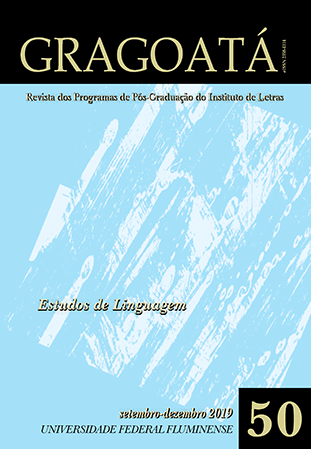Presidential New Year political speeches. Managing uncertainty
DOI:
https://doi.org/10.22409/gragoata.v24i50.34193Keywords:
Presidential political discourses of New Year, discourse genre, speaker’ images, discourse organization.Abstract
The Portuguese political regime is semi-presidential. The President of the Republic has specific functions that make his speeches central to his political action. This paper focuses on discourses, on how language is used on social practices marked by the linguistic nature of interaction. I analyze the discursive characteristics of a discourse genre with political tradition in the Portuguese Republic, the New Year Messages. Constituting a macro-act of vow of Happy New Year to Portuguese people, these speeches are determined by the characteristics of the speaker's political functions and by the goals he pursues in each particular interaction. Starting from the investigations carried out in discourse analysis and in linguistics of the enunciation (AMOSSY, 2000; BAKHTINE, 1984; BENVENISTE, 1966, 1970; KERBRAT-ORECCHIONI, 2002) and the literature on linguistics of enunciation (HAILON, 2012; MAINGUENEAU, 2014; MOIRAND, 2003; MARQUES, 2015, among others), we will study the ways in which the Portuguese presidents construct their discourses, and are also constructed in them. We will focus on the enunciative organization of the speeches, to analyze how the speaker stands relative to his own speech and to the object of his speech, and also to the speaker (s), according to a political agenda supported by the image of the president, by his legitimacy, which is institutional, but above all by his credibility, which is properly political (CHARAUDEAU, 2005; MARQUES, 2014). The data under analysis are constituted by New Year's Messages issued by the last three presidents of the Portuguese Republic between 1997 and 2017.
Downloads
Downloads
Published
How to Cite
Issue
Section
License
Authors who publish in Gragoatá agree to the following terms:
The authors retain the rights and give the journal the right to the first publication, simultaneously subject to a Creative Commons license CC-BY-NC 4.0, which allows sharing by third parties with due mention to the author and the first publication by Gragoatá.
Authors may enter into additional and separate contractual arrangements for the non-exclusive distribution of the published version of the work (for example, posting it in an institutional repository or publishing it in a book), with recognition of its initial publication in Gragoatá.

Gragoatá is licensed under a Creative Commons - Attribution-NonCommercial 4.0 International.











